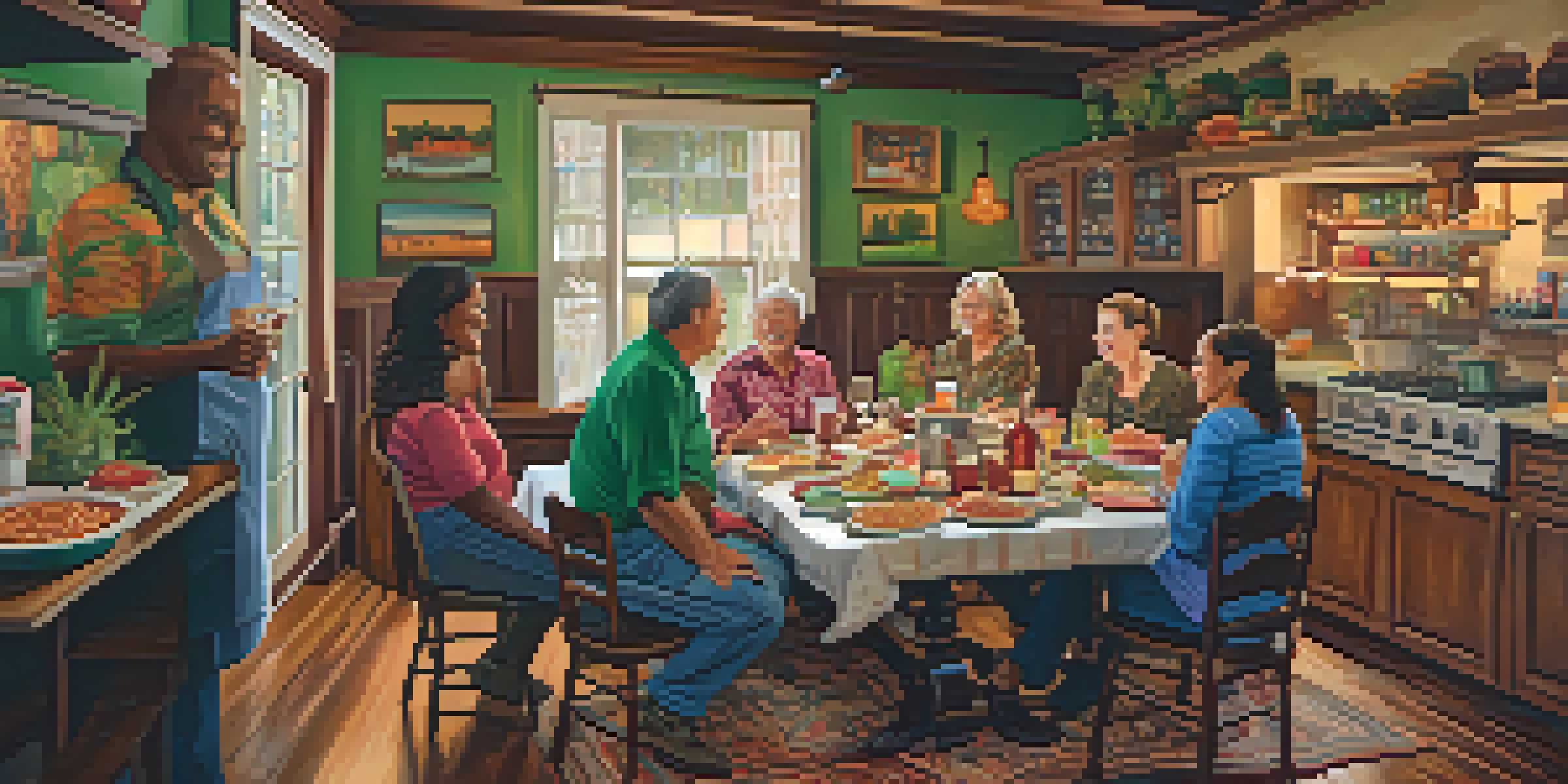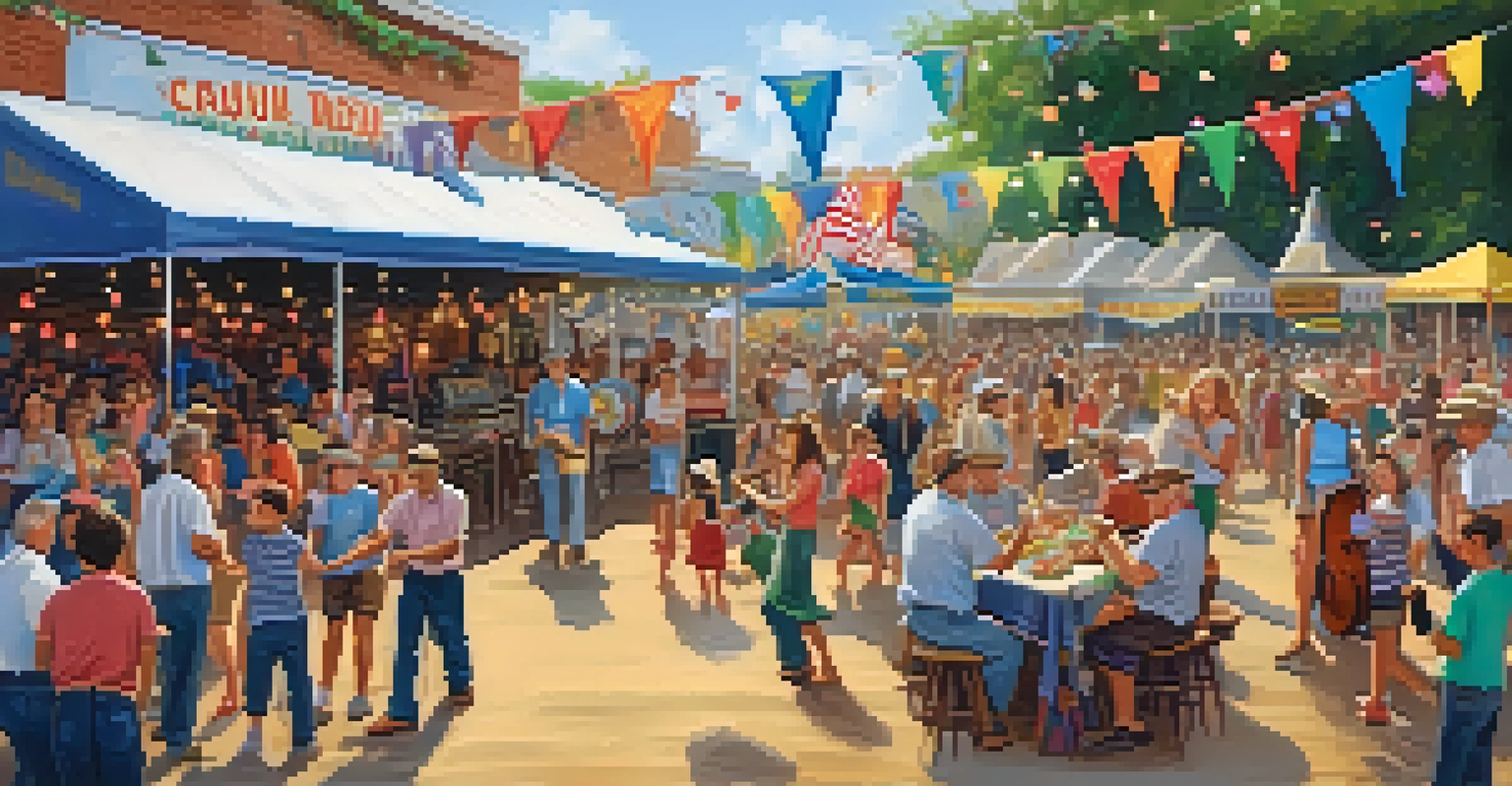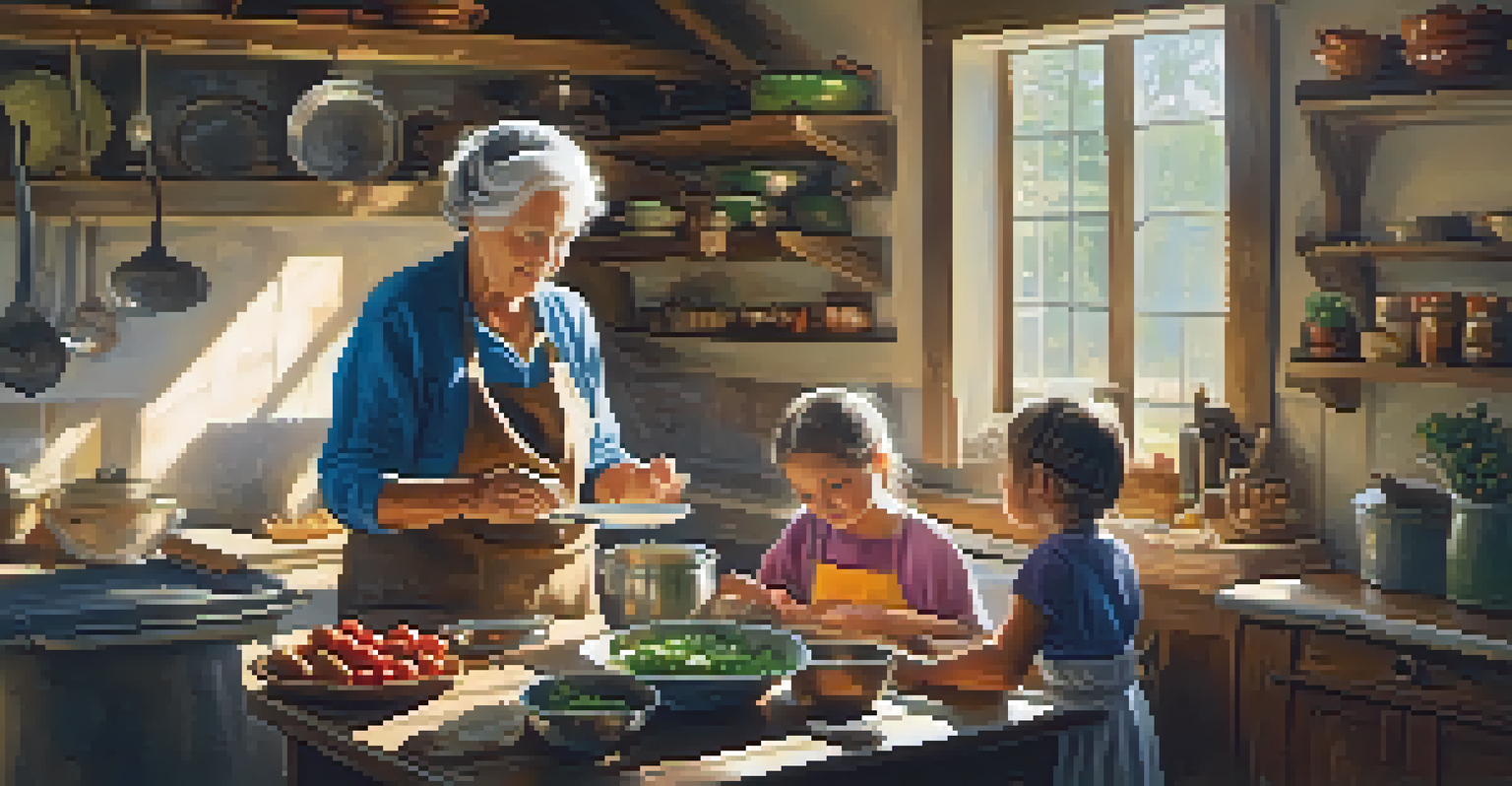Cajun and Creole Family Life: Traditions and Values

Cajun and Creole Heritage: Roots of Family Life
Cajun and Creole cultures are deeply rooted in the history of Louisiana, blending French, Spanish, African, and Native American influences. This rich tapestry of heritage forms the backbone of family life, where traditions are passed down through generations. For many families, understanding their cultural roots fosters a strong sense of identity and belonging.
Food is our common ground, a universal experience.
The history of these communities is often shared through storytelling, where grandparents narrate tales of resilience and celebration. These stories serve not only as entertainment but also as a means of instilling values like respect, hard work, and the importance of family ties. In this way, the past continues to inform the present, enriching family connections.
Moreover, festivals and community gatherings play a crucial role in preserving these traditions. Events like Mardi Gras and the Crawfish Festival bring families together to celebrate their shared identity, reinforcing bonds across different generations. Such communal experiences create lasting memories that families cherish for years to come.
Family Gatherings: The Heart of Cajun and Creole Life
Family gatherings are a cornerstone of Cajun and Creole life, often centered around food, music, and laughter. Whether it's a Sunday meal or a holiday celebration, these occasions are marked by delicious dishes like gumbo, jambalaya, and crawfish étouffée, showcasing the culinary heritage of the region. Food is not just sustenance; it’s a way for families to connect and share their love.

Music also plays a vital role during these gatherings, with the sounds of Cajun and Zydeco tunes filling the air. Families often engage in dancing and playing instruments, creating an atmosphere of joy and celebration. This musical tradition fosters a sense of community and belonging, as everyone participates in the festivities.
Cultural Heritage Shapes Identity
Cajun and Creole traditions, passed down through storytelling and communal gatherings, foster a strong sense of identity and belonging among families.
These gatherings reinforce familial bonds, reminding family members of their shared values and experiences. They act as a reminder of the importance of togetherness, creating a supportive network that extends beyond immediate family. Ultimately, these cherished moments are the glue that holds Cajun and Creole families together.
Culinary Traditions: A Flavorful Expression of Family Values
Food is an essential aspect of Cajun and Creole family life, reflecting cultural values and traditions. Recipes are often handed down through generations, with each family adding their unique twist. Cooking together not only nurtures the body but also fosters connection, as families gather around the kitchen to create their culinary masterpieces.
Family is not an important thing. It's everything.
Common meals often include local ingredients, highlighting the importance of community and sustainability. Families take pride in sourcing fresh produce from local markets or even their own gardens, emphasizing the connection to the land. This practice reinforces values of hard work and resourcefulness, teaching younger generations the importance of self-sufficiency.
Moreover, meals are often served with a side of storytelling—each dish has its own history and significance. Sharing these stories around the dinner table helps instill a sense of pride in cultural heritage. This culinary tradition is a flavorful expression of love and unity that brings families closer together.
Language and Communication: The Cajun and Creole Dialects
Language is a vital part of Cajun and Creole identity, with French and English often mingling in daily conversations. Many families maintain the use of Cajun French, a dialect that reflects their unique cultural heritage. This linguistic connection not only preserves tradition but also strengthens family bonds through shared understanding.
Communication within these families often extends beyond words, incorporating gestures and expressions that convey meaning. For instance, a simple nod or smile can express warmth and connection, demonstrating the value placed on non-verbal cues. This rich tapestry of communication fosters a sense of closeness among family members.
Food and Music Unite Families
Family gatherings centered around traditional dishes and lively music reinforce connections and shared values, creating lasting bonds.
Furthermore, teaching younger generations the family dialect is essential for preserving cultural identity. Parents and grandparents often encourage children to speak Cajun French at home, ensuring that the language continues to thrive. This effort reinforces the importance of family heritage and helps instill pride in their cultural background.
The Role of Religion in Cajun and Creole Family Life
Religion plays a significant role in Cajun and Creole family life, often guiding moral values and community engagement. Many families are deeply connected to the Catholic Church, which acts as a central hub for social and spiritual activities. This connection fosters a sense of community, where families support one another through shared beliefs and practices.
Traditions such as baptism, confirmation, and weddings are celebrated with great enthusiasm, often involving large family gatherings and elaborate ceremonies. These events serve as important milestones that strengthen familial ties and create lasting memories. They also emphasize the importance of faith as a foundation for family life.
Moreover, religious practices often blend with cultural traditions, creating unique celebrations that reflect both spiritual and familial values. For example, the Feast of Mardi Gras combines religious observance with festive celebrations, emphasizing the joy of community and family. This harmonious blend enriches family life, making faith an integral part of everyday experiences.
Respecting Elders: A Pillar of Cajun and Creole Values
In Cajun and Creole families, respect for elders is a fundamental value that shapes interactions and relationships. Elders are seen as the keepers of wisdom and tradition, holding a special place within the family structure. This cultural norm fosters an environment where younger generations are encouraged to seek guidance and learn from their experiences.
Family gatherings often highlight the importance of this respect, with younger members actively listening to stories shared by grandparents. These interactions reinforce values such as patience, humility, and gratitude, essential traits for nurturing strong family bonds. Elders, in turn, feel valued and appreciated, knowing their contributions are recognized.
Respect for Elders is Essential
In Cajun and Creole families, honoring elders as wisdom keepers cultivates respect and strengthens familial and community ties.
Additionally, this respect often extends beyond immediate family to include the broader community. Elders are often consulted for their opinions and advice in various matters, creating a culture of reverence. This practice not only strengthens familial ties but also promotes a sense of unity within the community.
Cajun and Creole Festivals: Celebrating Family and Community
Festivals are a vibrant expression of Cajun and Creole culture, bringing families and communities together to celebrate shared heritage. Events like the Bayou Country Superfest and the New Orleans Jazz & Heritage Festival highlight the region's music, food, and arts, offering a space for connection and joy. Families often participate in these festivities, creating cherished memories that last a lifetime.
During these festivals, families showcase their culinary talents and cultural traditions, sharing their unique dishes with others. This act of sharing not only promotes cultural pride but also reinforces the idea that food is a communal experience. It allows families to connect with both their heritage and the wider community.

Moreover, festivals often include activities for all ages, from music performances to crafts for children. This inclusivity ensures that everyone can participate, fostering a sense of belonging. Ultimately, these celebrations highlight the importance of family and community in Cajun and Creole life, creating bonds that transcend generations.